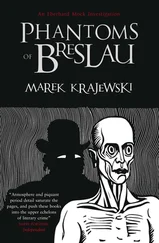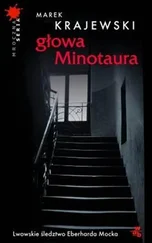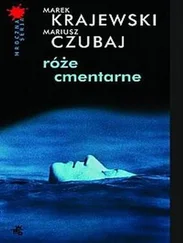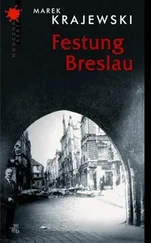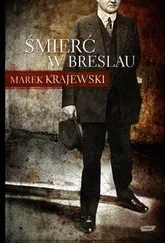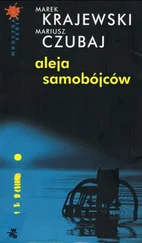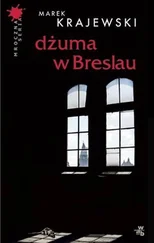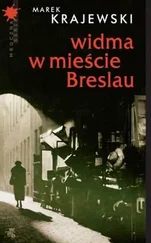Marek Krajewski - Death in Breslau
Здесь есть возможность читать онлайн «Marek Krajewski - Death in Breslau» весь текст электронной книги совершенно бесплатно (целиком полную версию без сокращений). В некоторых случаях можно слушать аудио, скачать через торрент в формате fb2 и присутствует краткое содержание. Жанр: Полицейский детектив, на английском языке. Описание произведения, (предисловие) а так же отзывы посетителей доступны на портале библиотеки ЛибКат.
- Название:Death in Breslau
- Автор:
- Жанр:
- Год:неизвестен
- ISBN:нет данных
- Рейтинг книги:3 / 5. Голосов: 1
-
Избранное:Добавить в избранное
- Отзывы:
-
Ваша оценка:
- 60
- 1
- 2
- 3
- 4
- 5
Death in Breslau: краткое содержание, описание и аннотация
Предлагаем к чтению аннотацию, описание, краткое содержание или предисловие (зависит от того, что написал сам автор книги «Death in Breslau»). Если вы не нашли необходимую информацию о книге — напишите в комментариях, мы постараемся отыскать её.
Death in Breslau — читать онлайн бесплатно полную книгу (весь текст) целиком
Ниже представлен текст книги, разбитый по страницам. Система сохранения места последней прочитанной страницы, позволяет с удобством читать онлайн бесплатно книгу «Death in Breslau», без необходимости каждый раз заново искать на чём Вы остановились. Поставьте закладку, и сможете в любой момент перейти на страницу, на которой закончили чтение.
Интервал:
Закладка:
† The Chronicles of Ibn Sahim . Trans. Dr Georg Maass.
VIII
BRESLAU, THAT SAME SATURDAY, JULY 14TH, 1934
HALF-PAST TWO IN THE AFTERNOON
Kurt Smolorz sat on the square in Rehdigerplatz, watching for Mock and becoming more and more worried about the state of his report. He was to have included the results of his surveillance of Konrad Schmidt, the iron fist of the Gestapo known as “fat Konrad” by screws and prisoners alike. These results were to help him find an effective means of coercion, that is, a “vice for Konrad”, as Mock metaphorically described it. From the information gathered by Smolorz, it could be concluded that Schmidt was a sadist in whom the number of fat cells was in reverse proportion to the grey matter of his brain. Before finding employment in the prison service, he had worked as a plumber, circus athlete and guard at the Kana alcohol distillery. From there, he had ended up in prison for stealing spirits. He was released after a year and here the chronology of his files broke off. Further files dealt only with Konrad the Screw. In this capacity, he had worked for the Gestapo for a year. Smolorz looked at his first annotation: “drinking vodka” below the heading “Weak Points”, and grimaced in anger. He knew that this remark would not satisfy his boss. Vodka, after all, could only be a “vice” for an alcoholic and fat Konrad certainly wasn’t one. The second entry ran: “Easily provoked into a brawl.” Smolorz could not imagine that this fact could be used against Schmidt, but it was not up to him, after all, to do the thinking. The third and last annotation: “Is probably a sexual pervert, sadist”, brought some hope that his week-long, strenuous labour would not go to waste.
He was also cross at Mock for forbidding him to use the usual official channels of communication which meant that he, Smolorz — instead of drinking cold beer somewhere now after having left the report on his boss’ desk — had to keep watch near Mock’s house for Lord knows how long.
It was not, as it turned out, long. A quarter of an hour later, Smolorz was sitting in Mock’s apartment with his much-desired, perspiring tankard and waiting with some impatience for his boss’ opinion. The opinion was more of a stylistic nature.
“What’s this, Smolorz, can’t you formulate your thoughts appropriately and officially?” The Criminal Director laughed out loud. “In official documents we write ‘tendency to intoxicating drink’ and not ‘drinking vodka’. Alright, alright, I’m pleased with you. And now, go home. I have to take a nap before I make an important visit.”
BRESLAU, THAT SAME SATURDAY, JULY 14TH, 1934
HALF-PAST FIVE IN THE AFTERNOON
The newly nominated Director of the University Library, Doctor Leo Hartner, stretched his bony torso and for the hundredth time cursed the architect who had designed the Baroque Augustinian monastery, now the magnificent building of the University Library on Neue Sandstrasse. The architect’s mistake, according to Harnter, lay in locating the elegant quarters, serving as the Director’s study at present, on the north side, thanks to which the room was cool — pleasant to everyone but its occupant. His aversion to temperatures below 20 °C was founded. This excellent specialist of Oriental languages had returned from the Sahara a few weeks ago after having spent close to three years studying the languages and customs of desert tribes. Now Breslau, in its summer heat, provided him with much-loved warmth but this, unfortunately, ended at the threshold of his study. The thick walls, the stone, heat-resistant barriers irritated him more than the freezing Sahara nights when deep sleep had isolated him from the prevailing cold. But here — within the closed expanse of his study — he had to act, make decisions and sign masses of documents with numb hands.
The coolness which prevailed in the room acted entirely differently on the two men comfortably ensconced on the leather armchairs. Both were breathing deeply and, instead of the swelter and dust of the street, they inhaled the bacteria and spores of mould born on the yellowing pages of volumes.
Hartner strolled nervously across the room. He held the piece of wallpaper with the “death verses”.
“Strange … The writing is similar to some I saw in Cairo in eleventh- or twelfth-century Arabian manuscripts.” His intelligent, slender face froze in thought. The short, grey hair bristled on the top of his head. “But it’s not the Arabic I know. To be honest, this doesn’t look Semitic to me at all. Well, please leave it with me for a few days; maybe I’ll break the code when I put some other language under the Arabic text … I see you’ve got something else for me. What photographs are these, Herr, Herr …?”
“Anwaldt. They’re copies of Doctor Georg Maass’ notes, which he himself described as being a translation of the Arabic chronicle of Ibn Sahim. We’d like to ask you, sir, for some more information about this chronicle, its author, and also the translation.”
Hartner skimmed Maass’ text. After a few minutes, his lips twisted into a pitiful smile.
“I see a number of characteristics of Maass’ academic writing in these few sentences. But, for the time being, I’ll reserve any comments as to the translation until I see the original text. You have to know, my dear sirs, that Maass is well known for his fantasizing, his stubborn dullness and a peculiar idee fixe which makes him perceive more or less hidden archetypes of the apocalyptic visions of the Old Testament in every ancient text. His academic publications are swarming with pathological images of annihilation, death and disintegration which he finds everywhere, even in works of love and festivity. I can also see it in this translation, but only when I’ve read the original can I say whether these catastrophic elements come from the translator or from the author of the chronicle, whom, by the by, I’m not acquainted with.”
Hartner was a typical armchair scholar who made his discoveries alone, entrusted the results of his research to specialist periodicals and expressed his pioneer’s euphoria to the desert sands. For the first time in several years, he had before him an audience which — although small — was listening attentively to his arguments. He, too, listened intently and with pleasure to his own deep baritone.
“I know Maass well, as also Andreae and other scholars analysing fictitious works, creating new theoretical constructions, moulding their heroes from the clay of their own imaginations. Which is why, in order to eliminate any fraud on Maass’ part, we have to check what he’s working on at the moment: whether he really is translating some ancient text or whether he’s creating it himself in the depths of his own imagination.” He opened the door and said to his assistant:
“Stahlin, ask the librarian on duty to come and see me. Tell him to bring the register of loans with him. We’ll check,” he addressed his guests, “what our exterminating angel is presently reading.”
He approached the window and lost himself in the cries of boys who had turned out in swarms on the grassy tuft opposite the cathedral and were bathing in the Oder. He shook his head, remembering his guests.
“But, dear sirs, please help yourselves to some coffee. Strong, sweet coffee is excellent in the heat — something the Bedouins know very well. A cigar perhaps? Imagine, that was the only thing I missed in the Sahara. I emphasize: thing, not person. Indeed, I took a whole trunkful of cigars, but it turned out that the Tibbu people were even more fond of them than I. I assure you that the very sight of those people is so terrifying that I would willingly hand anything over to them in order not to have to look at them. On the other hand, I bribed them with cigars so as to listen to their ancestral and tribal stories. They proved useful for my post-doctoral thesis, which I recently submitted for publication.” Hartner bellowed forth a large cloud of smoke and was on the point of presenting the arguments of this thesis when Anwaldt fired a question:
Читать дальшеИнтервал:
Закладка:
Похожие книги на «Death in Breslau»
Представляем Вашему вниманию похожие книги на «Death in Breslau» списком для выбора. Мы отобрали схожую по названию и смыслу литературу в надежде предоставить читателям больше вариантов отыскать новые, интересные, ещё непрочитанные произведения.
Обсуждение, отзывы о книге «Death in Breslau» и просто собственные мнения читателей. Оставьте ваши комментарии, напишите, что Вы думаете о произведении, его смысле или главных героях. Укажите что конкретно понравилось, а что нет, и почему Вы так считаете.

